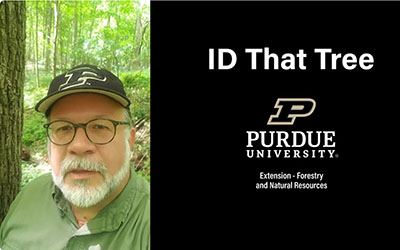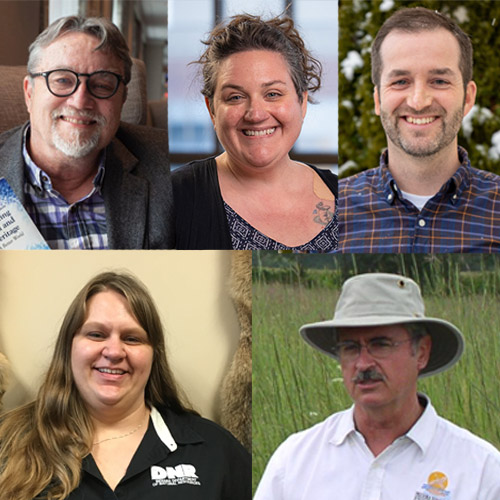Metazoa Beer to Benefit Help the Hellbender Lab
Metazoa Brewing Company and the Indiana Lakes Management Society have teamed up to collaborate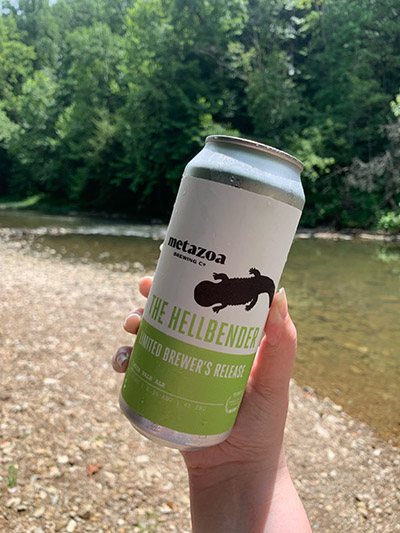 on a new Indiana beer, which will raise money for the Help the Hellbender lab at Purdue.
on a new Indiana beer, which will raise money for the Help the Hellbender lab at Purdue.
The idea for the development of The Hellbender IPA originated at the Indiana Lakes Management Society conference in March after a member presentation about the cross-section of aquatics and herpetology in Indiana and the importance of water quality for all sorts of species, including the eastern hellbender salamander.
During debriefing, ILMS board members talked about how the group could broaden their horizon as a lakes organization to bring awareness to water quality initiatives and to different forms water takes in the state.
“A comment was made by a board member about how cool it would be to make a beer for Lakes Appreciation Month, which our organization works to get decreed each year in July by the state administration,” said Grace Patchett (Natural Resources and Environmental Science 2020), laboratory manager at Aquatic Control and the secretary of the executive board for ILMS. “Personally, I’m someone who thinks if someone has a good idea we should at least try to explore if it’s something we can turn into reality, so I tasked myself with contacting the Indiana Craft Brewers’ Association, who put me in contact with Metazoa.
“Most agriculture students have in some way during their time at Purdue heard about the hellbender laboratory and the incredible work they have done in conservation of the eastern hellbender. To me, it felt like such a perfectly charismatic creature, and such a great group of individuals who could be a resource in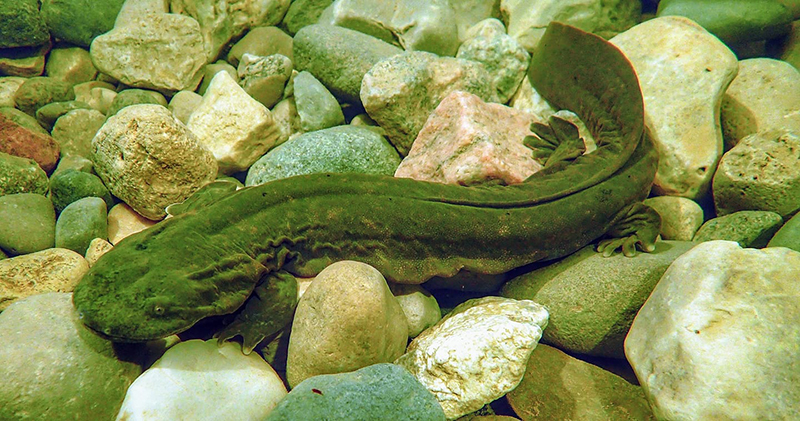 programming events to go along with the production of a beer, it was a no-brainer to reach out to the hellbender lab to see if they would be interested. From there, the rest essentially fell into place.”
programming events to go along with the production of a beer, it was a no-brainer to reach out to the hellbender lab to see if they would be interested. From there, the rest essentially fell into place.”
To increase awareness about hellbenders and broaden the group’s knowledge about the species, ILMS hosted a lunch-time webinar for its membership in June, including a showing of the Teardrop Pictures documentary “Hellbender in the Blue.”
In the meantime, the team at Metazoa Brewing Company was busy brewing and canning 20 cases of The Hellbender, an India Pale Ale. The beer launched at a tapping party on July 13 and can now be purchased exclusively at the brewery’s downtown taproom, located at 140 S. College Ave in Indianapolis, while supplies last.
“Since opening in 2016, Metazoa has donated 5% of all beer sales to various animal and wildlife organizations and will be donating 5% of The Hellbender can sales to the Help the Hellbender initiative as well,” said Taylor Williams, director of marketing and events for Metazoa. “We've worked with other conservation organizations, including the White River Alliance, to shed more light on the importance of protecting Indiana's waterways and lakes and the many animals who occupy them, so the opportunity to continue to help shed light on the importance of Indiana water quality with The Hellbender beer was an easy "yes!" from everyone at Metazoa!”
Purchasers of the beer also will notice a QR code on the can, which can be scanned to donate directly to the Help the Hellbender lab’s research. Interested parties also can donate online.
“This was a great opportunity to increase awareness of hellbenders and their conservation needs in the state,” said Dr. Jason Hoverman, professor of vertebrate ecology at Purdue and director of the Help the Hellbender lab. “We greatly appreciated the opportunity to collaborate with Metazoa and the Indiana Lakes Management Society on this effort, which will generate much needed financial support for the Help the Hellbender program as we continue our conservation activities."
ILMS membership got to see firsthand the impact of the Help the Hellbender program, participating in a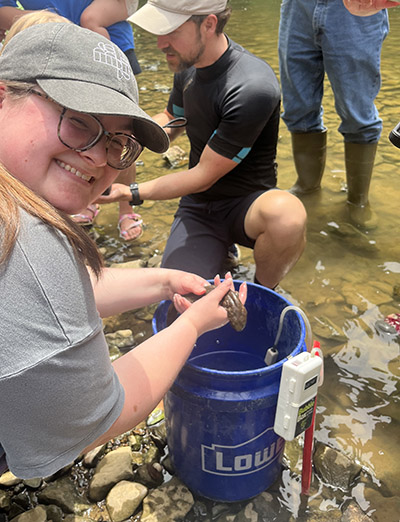 hellbender release, one of several set for the summer of 2024, where captive-reared, juvenile hellbenders will be released back into their native areas to assist with increasing the population and the opportunity for wild breeding.
hellbender release, one of several set for the summer of 2024, where captive-reared, juvenile hellbenders will be released back into their native areas to assist with increasing the population and the opportunity for wild breeding.
The eastern hellbender (Cryptobranchus alleganiensis alleganiensis) is a large, fully aquatic salamander, nicknamed the snot otter, water dog, devil dog, Allegheny alligator and water eel among other things. Their decline statewide has been documented as far back as the early-to-mid 1900s as a result of habitat loss and poor water quality. Hellbenders play an important role in aquatic ecosystems and are indicators of clean water.
For much of the last 17 years, Dr. Rod Williams and his team have been researching eastern hellbenders, spearheading regional conservation efforts and advancing hellbender captive propagation, or the rearing of this ancient animal in captivity and their eventual return to the wild. The partnership had a major breakthrough in the summer of 2023 with the documentation of a baby hellbender salamander in the Blue River while conducting routine surveys. This discovery is significant because over the past three to four decades, only adult hellbenders have been documented in the Blue River. The presence of a baby, or larval, salamander suggests that conservation efforts and rearing programs are accomplishing their goals for the recovery of this endangered species.
The Help the Hellbender lab is actively collaborating with the Indiana Department of Natural Resources, Indiana Division of Fish and Wildlife and The Nature Conservancy as well as several other partners across 13 states on a number of conservation projects and educational opportunities for teachers, children, farmers and more.
The newest addition to the partnership’s conservation efforts is the Farmers Helping Hellbenders project, which offers funding opportunities to agricultural producers in the Blue River – Sinking Watershed to implement conservation practices on their land to assist with topsoil retention, the improvement of aquatic resources and the recovery of Eastern Hellbenders.
The project, which is made possible by a $2.7 million in funding from the U.S. Department of Agriculture’s Regional Conservation Partnership Program, aims to improve hellbender habitat in a four-county region in south central Indiana, the only remaining habitat for hellbenders in the state, by expanding the use of agricultural conservation practices that lead to decreased sedimentation in local rivers systems. Williams talks more about hellbenders and the Farmers Helping Hellbenders project in this YouTube video.
Eligible producers and forest land owners who wish to implement conservation practices on their land should discuss their options with their local district conservationist. For more information or to submit an application, contact your local district conservationist by visiting Farmers.gov/Service-locator.
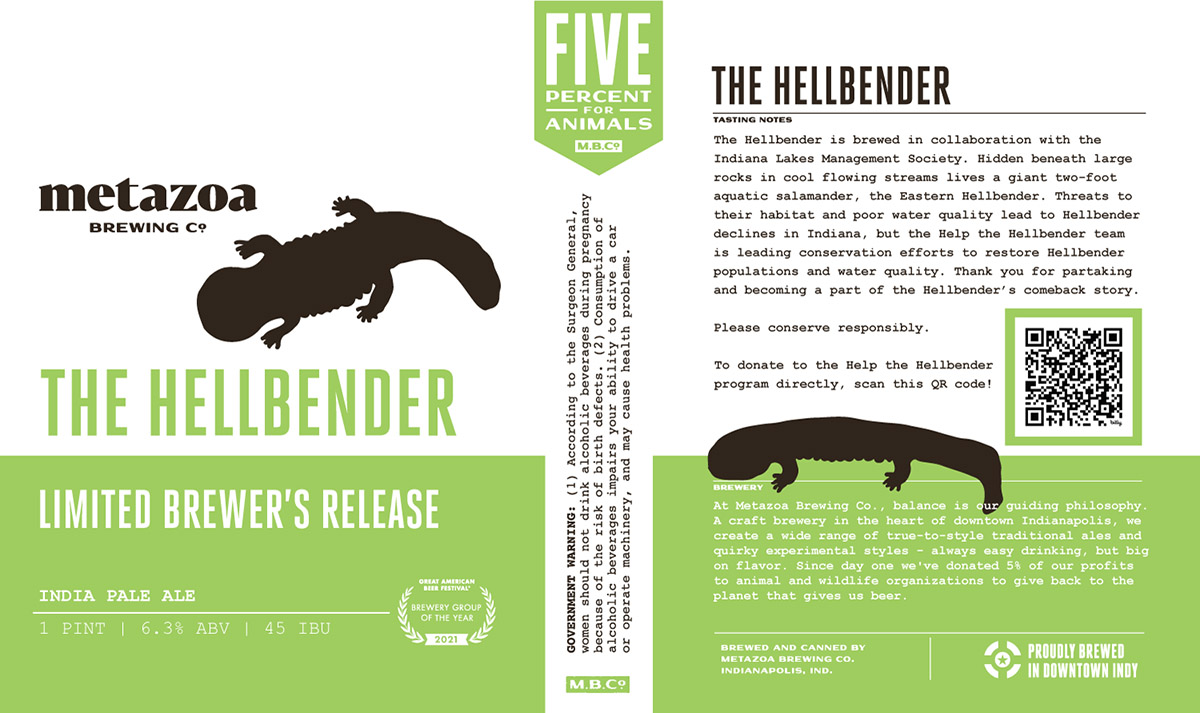 The label of The Hellbender IPA from Metazoa Brewing Company
The label of The Hellbender IPA from Metazoa Brewing Company 



